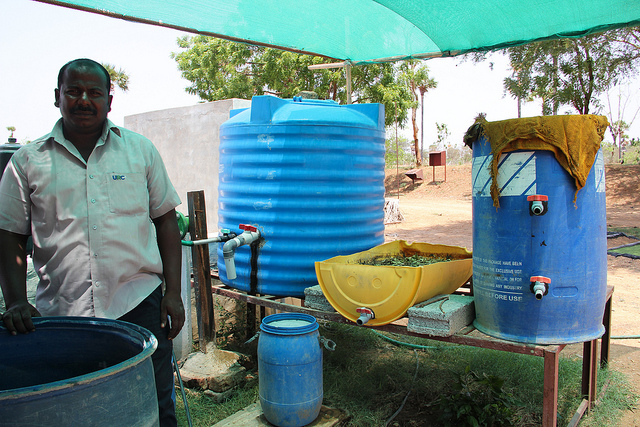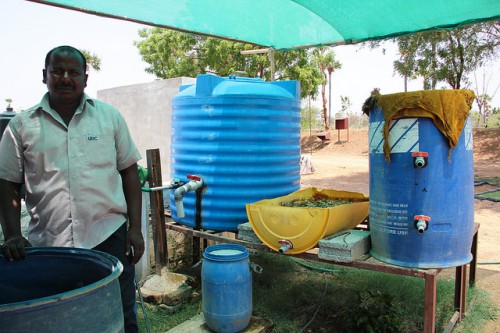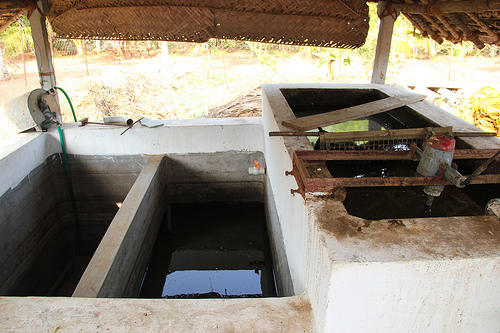TBI Innovations: An Organic Manure Factory for Rs. 800 Only!
An innovative idea by a farmer in Chennimalai, Tamil Nadu lets farmers create their own liquid manure out of the cow dung and urine available in their farms. Watch him explain how the organic manure factory works and how it can be set up by just anyone for a cost of Rs.800 only!

An innovative idea by a farmer in Chennimalai, Tamil Nadu lets farmers create their own liquid manure out of the cow dung and urine available in their own farms.
Nitrogen and phosphorus are essential for plant growth – that is common knowledge for farmers. Cow dung contains nitrogen – that is also common knowledge for farmers. Then why is it that many farmers look for costly solutions rather than use the abundant cow dung they have in their farms as manure? Luckily, one farmer did think of this.

Four years ago, with a little documentation help from the MYRADA Krishi Vigyan Kendra in Gobichettipalayam, Erode district (Tamil Nadu), India’s farming fraternity recognized farmer G. R. Sakthivel’s efforts in successfully using cattle refuse to create liquid manure to feed his crops. This feat is by no means ordinary and did not happen overnight. A staunch advocate of the organic movement, Sakthivel had always wanted to utilise resources around him efficiently and he wasn’t going to leave out cattle refuse, which was there aplenty in all farms.
After years of careful observation and planning, he came up with a plan to recycle cow dung and urine from his farm. He designed a 4-compartment unit for this purpose. First, the floor of the cattle shed was sloped to direct the urine into a channel. This urine drained into a collection tank. Next the dung was removed manually from the floor. The collected dung-urine mixture was allowed to settle and filter stage by stage inside a compartment. The process resulted in a nutrient-rich filtrate. He diluted this filtrate and used it to directly irrigate his sugarcane fields using drip lines. The dung residue was not wasted either. It was directed into the bio-gas producing facility, which converted the waste into methane gas to fuel the family kitchen.
Though this set up drew the attention of several farmers across the country, not many embraced it as it was expensive; the 4-tank collection and settling masonry structure cost a minimum of Rs. 40,000 including materials and labour. Farmers with small holdings couldn’t justify this expense, as much as the end result seemed worthwhile.

Alagesan, a farmer in Myladi in Chennimalai decided to experiment with Sakthivel’s model. He wanted to create a simpler and more cost effective liquid manure plant so that more farmers could benefit from the readily available manure on their own farms.
He did away with the dung collection and settling tanks since that was the major expense. Instead, he came up with a single container manure factory. No cement structures, no labour charges, no building costs. All he used was a huge plastic barrel.
Cow dung and urine is dumped in it together and allowed to settle for 24 hours. For every kilo of cow dung, 5 litres of cow urine is added. A little jaggery is then added to this mixture to help ferment it and voila! At a fraction of the cost, the same liquid manure is ready! This entire set up costs just Rs. 800 – 1000. Watch the video below as Alagesan explains how one can set up an organic manure factory on one’s own and how it works. (If you cannot watch the video here, please click on this Youtube link.)
The barrel set up has two advantages. The first and most obvious is the affordability. The second and equally important advantage is portability. Unlike the immovable masonry structure, the barrel can be moved according to the farmer’s requirement to any part of the field. Maintenance is much simpler as well as cleaning doesn’t take much time or effort.
Both these men are still working towards simplifying the process further so that these manure churners can be placed in as many farms as possible. While many farmers in and around Erode have set up these manure factories, it will still be some time before these portable manure factories become as common as a plough or a sickle, which is found in every farm.
Many thanks to Mr. P. Alagesan, Programme Co-ordinator, and the staff of MYRADA Krishi Vigyan Kendra, Gobichettipalayam, Erode district for their help and support.
This story made me
-
97
-
121
-
89
-
167
Tell Us More
We bring stories straight from the heart of India, to inspire millions and create a wave of impact. Our positive movement is growing bigger everyday, and we would love for you to join it.
Please contribute whatever you can, every little penny helps our team in bringing you more stories that support dreams and spread hope.



















